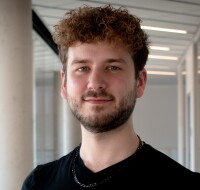Pieber Group
Catalysis and Synthetic Methodology
Nature uses solar light as energy source to convert raw materials such as CO2 and water into complex molecules. From a synthetic chemists’ perspective, visible-light can be considered an ideal reagent. In contrast to conventional reagents, light is non-toxic, generates no waste, and can be obtained from renewable sources.
The mission of the PieberLab is to unravel the full potential of visible-light photocatalysis as a powerful and sustainable strategy for synthetic organic chemistry by developing new catalysts and methods. We aim to provide solutions for challenging chemical problems and to realize sustainable, robust photocatalytic transformations. The research in our group is driven by curiosity and the understanding of photophysical properties of photocatalysts as well as reaction mechanisms. A key aspect of our research philosophy is to learn from other areas such as materials sciences.
We are particularly interested in heterogeneous photocatalysis using organic and inorganic semiconductors. These materials are promising sustainable alternatives to common homogeneous photocatalysts given their high stability, straightforward preparation, and ease of catalyst recycling. Another focus is the development of photocatalytic methods in which the choice of wavelength can be used as a parameter to control the outcome of the reaction.
Team
Current Projects
Design of (photo)catalysts | Photoactive ligands | Light-mediated cross-couplings | Light-mediated bond cleavage | Heterogeneous photocatalysis | Chromoselective synthesis
Career
Since 2023 Assistant Professor, Institute of Science and Technology Austria (ISTA)
2020 – 2023 Lecturer (Dozent), University of Potsdam, Germany
2018 – 2023 Group Leader at the Max Planck Institute of Colloids and Interfaces, Potsdam, Germany
2022 Visiting Associate, California Institute of Technology, USA
2016 – 2017 Postdoc, Max Planck Institute of Colloids and Interfaces, Germany
2011 – 2015 Ph.D., University of Graz, Austria
2009 – 2011 M.Sc., University of Graz and Graz University of Technology, Austria
2006 – 2009 B.Sc., University of Graz and Graz University of Technology, Austria
Selected Distinctions
2022 Plus 3 Perspectives Programme – Boehringer Ingelheim Foundation
2022 JSP Fellowship – Bürgenstock Conference (Swiss Chemical Society, SCS)
2020 Thieme Chemistry Journals Award (Thieme)
2018 Brandenburg Post-Doc Award (Ministry of Science, Research & Cultural Affairs)
2018 Liebig Fellowship (German chemical Industry Funds)
2018 Science Award (Austrian Chemical Society GÖCH)
2016 Doctoral Thesis Award (Austrian Chemical Society GÖCH)
Additional Information
Download CV
Visit the group website
The PieberLab on Twitter
Chemistry Colloquia website













